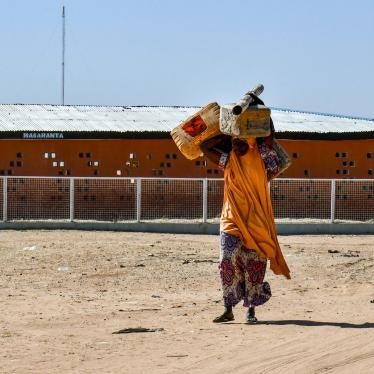The U.N. Commission on Human Rights must reinstate human rights monitoring in Sudan and strongly condemn abuses in Darfur, a western region of Sudan, where one of the world’s worst human rights and humanitarian crises is unfolding, Human Rights Watch said today.
The Commission, which on Thursday is scheduled to vote on a resolution on Sudan, should unequivocally condemn crimes against humanity and other abuses committed by government forces and allied militias in Darfur and reinstate the mandate for the special rapporteur for human rights in Sudan under item 9 of the agenda, Human Rights Watch said. Last year the Commission ended a 10-year monitoring mandate in Sudan because it appeared that the 20-year civil war in the southern part of the country would be settled.
“Darfur presents a critical test of the Commission’s credibility.” said Joanna Weschler, Human Rights Watch’s U.N. Representative. “With thousands of civilians already killed and hundreds of thousands forcibly displaced, this is exactly the kind of human rights disaster where the Commission needs to appoint a monitor.”
Since February 2003, the Sudanese government and its allied Arab militias have waged a brutal war against a rebel insurgency in Darfur. Government military operations have mainly targeted civilians who share the same ethnicity as members of the rebel groups. Government forces and allied militias have killed thousands and have forced more than 750,000 people to flee their homes within Sudan and another 120,000 to seek refuge across the border in Chad.
In interviews with Sudanese refugees in Chad, Human Rights Watch researchers documented widespread and systematic abuses committed in Darfur by government forces acting in complicity with the Arab militias known as “janjaweed.” Refugees consistently described indiscriminate aerial bombardment of civilian villages, the looting and burning of their homes by government forces and militia members, and incidents of murder, rape and abductions of women, children and the elderly.
On April 7, U.N. Secretary-General Kofi Annan urged in a speech to the Commission on Human Rights that “international humanitarian workers and human rights experts be given full access to the region, and to the victims, without further delay.” He stressed that if such access was denied, the international community must “take swift and appropriate action.”
Nevertheless, the Sudanese government reportedly denied access to Darfur by an emergency mission from the Office of the High Commissioner for Human Rights (OHCHR) during its recent fact-finding mission to neighboring Chad, just a few days after the Secretary-General’s speech.
“If the Commission does not act now, even when confronted with evidence of crimes against humanity in Darfur, when will it respond?” Weschler asked.
Last week the European Union (EU) put forward a resolution calling for a special rapporteur to monitor human rights abuses in Sudan, but the vote was postponed until April 22 at the request of the African group, a coalition of African member states of the Commission. The African group, coordinated by the government of Congo-Brazzaville, has consistently blocked scrutiny of African governments regardless of their human rights records.
Ireland and the Netherlands are leading the EU efforts to negotiate with the African members of the Commission on a consensus “Chairman’s statement” that is likely to be less critical of Sudan’s actions—and unlikely to result in the appointment of a special rapporteur.
Human Rights Watch called on all members of the Commission to refrain from opting for the weaker Chairman’s statement, and instead support a strong resolution on Sudan that includes the reinstatement of a special rapporteur on human rights.






